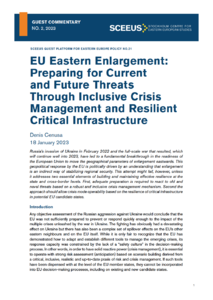
EU Eastern Enlargement: Preparing for Current and Future Threats Through Inclusive Crisis Management and Resilient Critical Infrastructure
Russia’s invasion of Ukraine in February 2022 and the full-scale war that resulted, which will continue well into 2023, have led to a fundamental breakthrough in the readiness of the European Union to move the geographical parameters of enlargement eastwards. This geopolitical response by the EU is politically driven by an understanding that enlargement is an indirect way of stabilizing regional security. This attempt might fail, however, unless it addresses two essential elements of building and maintaining effective resilience at the state and cross-border levels. First, adequate preparation is required to react to old and novel threats based on a robust and inclusive crisis management mechanism. Second the approach should allow crisis mode operability based on the resilience of critical infrastructure in potential EU candidate states.
Source: the Stockholm Centre for Eastern European Studies (SCEEUS)